Khamenei, Khomeini Street Banner Set On Fire In Iran
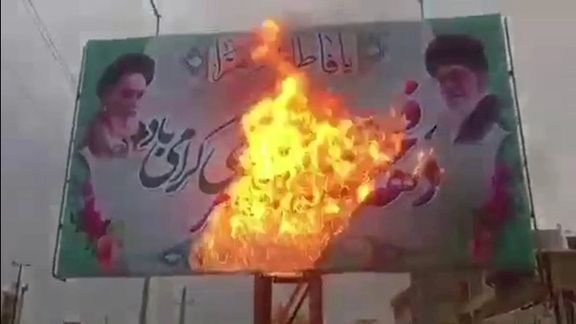
A banner of Iran’s Supreme Leader Ali Khamenei and Islamic Republic’s founder Ruhollah Khomeini was set on fire in the central city of Yazd.

A banner of Iran’s Supreme Leader Ali Khamenei and Islamic Republic’s founder Ruhollah Khomeini was set on fire in the central city of Yazd.
A video of the incident on Saturday went viral, showing the pictures of Khomeini and Khamenei burning on top of an overpass in the city, a scene recurring frequently especially since the popular protests gained momentum across the country on the backdrop of rising prices and a falling currency.
Several pictures and statues of the Islamic Republic leaders and important figures have been set on fire in recent months as anti-government protests and strikes have taken place on a regular basis in many cities throughout the country.
Statues and pictures of Khomeini, Khamenei, and President Ebrahim Raisi as well as the slain IRGC Quds Force Commander Qasem Soleimani are the top targets for the political vandalism in cities such as Tehran, Esfahan, Yazd, Qom, and Kermanshah.
According to an online survey by a Netherlands-based institute, over 60 percent of Iranians want regime change or "transition from the Islamic Republic".
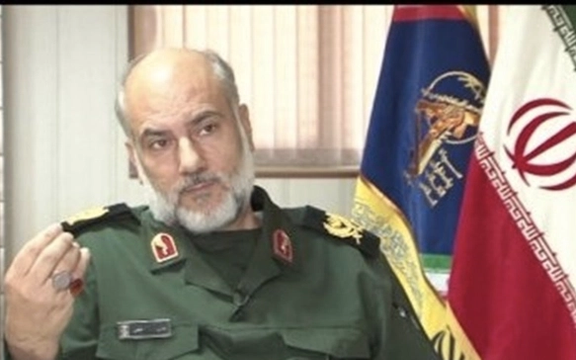
The head of the IRGC's unit responsible for the Supreme Leader’s protection was replaced two days after the dismissal of its intelligence chief, Hossein Taeb.
In a statement Saturday, the IRGC Spokesman Ramezan Sharif announced that Brigadier General Hassan Mashruifar has been appointed as commander of an elite IRGC unit, Sepah-e Vali-ye Amr (Supreme Leader’s [Protection] Corps, by the IRGC Commander-in-Chief Hossein Salami.
The statement also said Salami awarded the former commander of the protection unit, Brigadier General Ebrahim Jabbari with a certificate of appreciation for his services. Jabbari served as Taeb’s deputy when he headed the IRGC’s militia organization (Basij) before he was appointed as the IRGC intelligence chief.
Sepah-e Vali-ye Amr is one of the subsidiaries of the IRGC’s Intelligence Protection Organization (Sazeman-e Hefazat-e Sepah). Sepah-e Vali-ye Amir is solely responsible for protection of the Supreme Leader and was officially established in mid-1980s and is believed to consist of as many as 12,000 highly trained forces.
Although many consider Ta’eb’s replacement after 13 years at the helm of the IRGC Intelligence Organization (SAS) as ‘dismissal’, for reasons not yet revealed, media linked with the IRGC on Saturday downplayed the importance of Ta’eb’s removal and claimed that replacing him was a step towards an “intelligence onslaught on the enemy” and an “increase in operations against Israel” by the SAS.
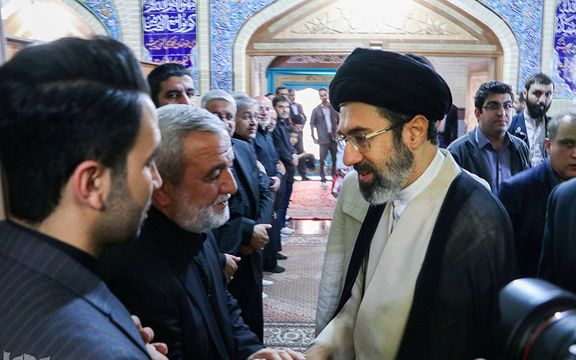
Replacing Ta’eb, a mid-ranking cleric with a military background, with an IRGC general signals “restructuring for a new era and as a step forward”, the IRGC-linked Tasnim news agency wrote. This means that Iran can take “further steps against the ambitions of the United States and Israel,” Tasnim said, adding that Ta’eb will be contributing to the restructured organization as an adviser to the commander-in-chief of the IRGC.
The title of adviser is often given to officials in Iran after dismissal to protect their reputations and not to admit that the persons in question made mistakes or were not fit for the positions they occupied.
The IRGC-linked Javan newspaper called the appointment of Brigadier General Mohammad Kazemi, referred to by his nom de guerre Haj Kazem, as “injection of new blood” into SAS to fight against “foreign enemies, their lackeys and mercenaries, and hostile elements [political activists and organizations]”.
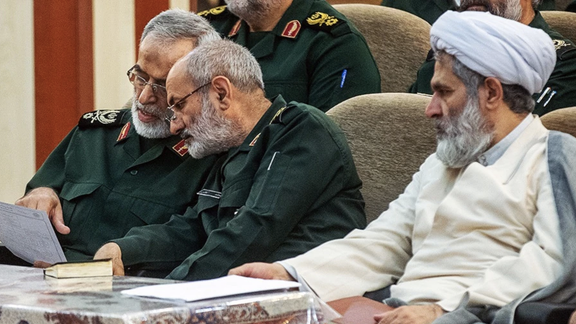
Sources familiar with the situation have told Iran International that Taeb was replaced due to long-simmering opposition by other top security figures, including the chief commander of IRGC’s Quds (Qods) Force Esmail Ghaani (Qaani) and Esmail Khatib, the minister of intelligence.
They also said Ta’eb’s high-ranking opponents argued that his organization did not use “the elementary standards for neutralizing terrorist activities” in Iran and charged that the recruitment of “amateurish and non-professional” elements in extraterritorial operations harmed Iran’s other security entities.
Jamshid Barzgar, journalist, told Iran International on Saturday that changes in the SAS leadership will not be effective against the intelligence operations conducted by Israel inside Iran.
According to Barzgar, the revelation of plans to dismiss Ta’eb by Israel’s KAN television several days before its announcement in Iran is a sign of deep penetration by Israeli intelligence in Iran, which has caused huge concern of various officials regarding their own safety and security in the face of Israeli threats.
The reason for Ta’eb’s dismissal is due more to disputes and disagreements inside the Iranian intelligence bodies rather than his inefficiency in dealing with foreign threats or carrying out operations, Barzgar said, adding that his successor has also been responsible for all these failures.
The Islamic Republic has two major intelligence organizations: the Ministry of Intelligence and the IRGC Intelligence Organization (SAS in Persian acronym). The ministry nominally is under the president’s control and regards itself as the most professional entity. But in fact, it is also controlled by Khamenei, who selects the minister.
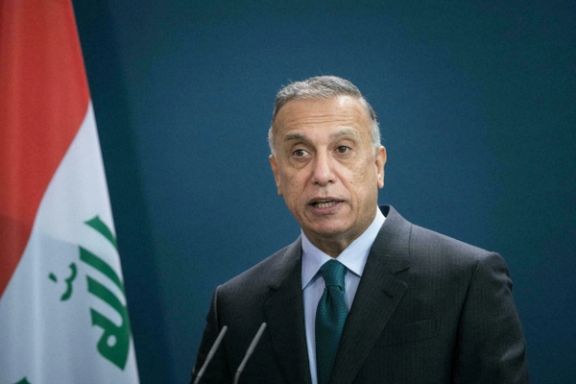
Iraqi Prime Minister Mustafa al-Kadhimi is scheduled to visit Iran after Saudi Arabia, an informed source has said.
Iraq's Shafaq News Agency quoted the source as saying that al-Kadhimi would visit Iran within 24 hours after participating in the Riyadh summit.
Relations between Iran and Saudi Arabia as well as Iraq’s parliamentary reconfiguration following the mass resignation of the Sadrist bloc will probably be on the agenda of the Iraqi premier’s visit.
Iran and Saudi Arabia -- which are locked in proxy conflicts around the region -- have held several rounds of talks in the Iraqi capital Baghdad since 2021 to improve their ties, severed since 2016, with no major results so far.
On Thursday, Iraq's parliament swore in dozens of new lawmakers, enlarging the Iran-backed bloc in the assembly about two weeks after a group of 73 parliamentarians loyal to the powerful Shiite cleric Moqtada al-Sadr resigned on June 12 upon his order following eight months of stalemate over forming a new government.
Last week, Iraqi Foreign Minister Fuad Hussein criticized the Islamic Republic's interference in Iraq's internal affairs. He also said earlier this month that Baghdad had submitted a formal complaint to Iran for its aggressive behaviors toward Iraq and the Kurdistan Autonomous Region, and denied Iran's allegations that the Israeli Mossad is present in Erbil.
In March, Iran fired missiles at Erbil, claiming it used 12 ballistic missiles in that attack and targeted an Israeli intelligence center.
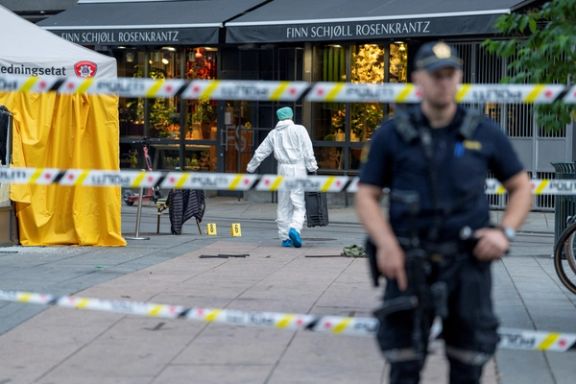
A Norwegian-Iranian man embarked on a shooting spree in a gay bar and the surrounding streets in Oslo on Saturday, killing two people and injuring more than 20.
The rampage took place inside and outside the London Pub, a well-known gay bar and nightclub open since 1979, as well as at one other bar in the center of the Norwegian capital in the early hours of the day as the city's LGBTQ+ community was due to celebrate its annual Pride parade, which is now called off upon police recommendations.
The 42-year-old suspect, identified as Zanyar Matapour, was detained minutes after the attack, according to police who said they believed he acted alone. Two weapons, a pistol and a fully automatic rifle, were retrieved from the crime scene.
"There is reason to think that this may be a hate crime. We are investigating whether the Pride was a target in itself or whether there are other motives," police said, adding that the man was “suspected of murder, attempted murder and terrorist acts.” “The attack was also being investigated as “a possible act of terrorism.”
Norwegian police, who are not normally armed, will now carry guns until further notice as a precaution, Commander Benedicte Bjoernland said. Norway's PST intelligence service said that it was investigating whether there could be further attacks.
The Nordic nation of 5.4 million has lower crime rates than many Western countries, although it has experienced hate-motivated shootings, including when Neo-Nazi extremist Anders Behring Breivik killed 77 people in 2011.
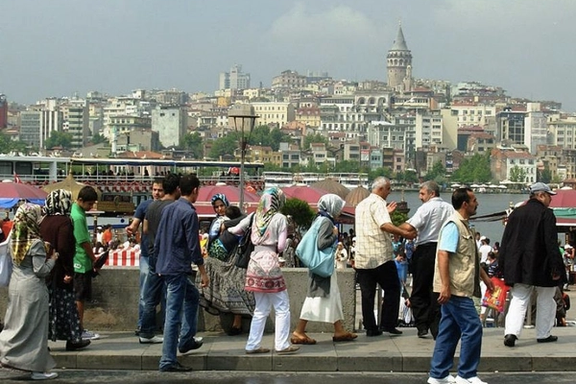
Israeli media have quoted a senior security official as saying that three separate Iranian squads were operating in Turkey, trying to attack Israeli ciizens.
Ynet news website quoting the official late Friday [June 24] reported that at least one attack was thwarted in the last minute. The target of one of the Iranian squads was the former Israeli ambassador to Turkey and his wife.
“A squad watched over them and was on its way to assassinate them, but the attempt was prevented,” the source said.
Another squad tried to hit Israeli tourists. "Their murder was prevented at the last second. They captured the squad just before a deadly terrorist attack, just before a bullet in the head," he said.
Israel began warning its citizens not to travel to Turkey at the end of May and the alerts became more frequent in mid-June. Turkey announced on June 23 that it had arrested 8 people, five of them Iranians, who were plotting attacks.
Tensions soared between Iran and Israel with the assassination of a top Iranian Revolutionary Guard (IRGC) operative in Tehran on May 22. Two assailants on a motorbike fired several bullets at Col. Hassan Sayyad-Khodayari outside his home in broad daylight, prompting Iranian officials to accuse Israel of organizing the attack, and vowed revenge.
This incident was followed by more mysterious deaths of IRGC officers and weapons experts, which were again blamed on Israel that has not denied responsibility as it is engaged in a secret war with the Islamic Republic.
One apparent fallout of repeated killings and sabotage operations in Iran was the head of IRGC’s Intelligence organization who was abruptly dismissed on June 23. Hossein Ta’eb, who was in charge of the secretive organization in charge of both internal security and secrets operations abroad for more than a decade was reportedly pushed out by his rivals.
Iran International reported on Friday that according to its sources, other security and intelligence chiefs in Iran did not like Ta’eb’s push into their turfs and found his recent failures in preventing alleged Israeli attacks as an opportunity to ask the Supreme Leader to fire him.
The Israeli source told Ynet that his country’s tactics forced Ta’eb to make “a lot of mistakes”, which made it easier to stop the terror squads. The Iranian spy chief was under pressure to attack Israelis and that is when he lost temper and made mistakes, the source said.
Iran’s foreign ministry on Friday vehemently denied all reports about assassination plans in Turkey, calling them an Israeli plan to harm Tehran’s relations with Ankara. But some Turkish media reported that a group of Israeli tourists in the Biaoolo district, were stopped by Mossad agents as they entered their hotel and were whisked away in armored vehicles and returned to their country.
The source quoted by Ynet also said that warnings for Israelis not to visit Turkey still stand because there is the possibility of more Iranian squads still remaining in the country.
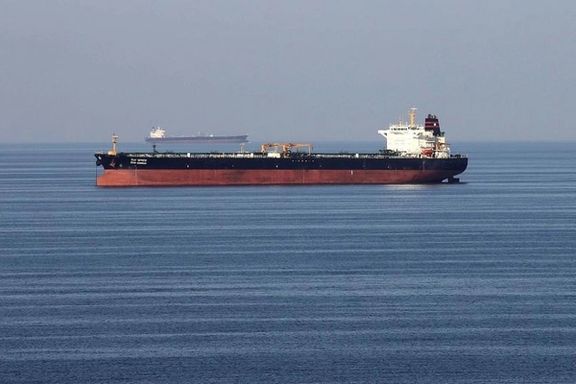
Advocacy group United Against Nuclear Iran (UANI) says two Iranian tankers are unloading their cargoes at the Baniyas Single Buoy Mooring (SBM) and a third is on its way to the port.
UANI Chief of Staff Claire Jungman published the photo of the tankers in a tweet on Friday explaining that Iranian tankers Daran and Golroo are discharging at the Baniyas SBM, while Arman 114 is engaged in an STS transfer with Traden, which is sailing under the flag of Cameroon after repairs in Turkey earlier this year.
In order to avoid detection of the destination of its cargo, Iran usually uses ship-to-ship transfers, in which the vessels turn off their transponders at the sea and secretly transfer oil cargo.
According to data by the UANI, Syria is the second largest importer of the Iranian oil after China. The Islamic Republic delivered more than 111,000 barrels of oil per day to Syria in the previous month.
It is not clear whether or how Iran is being paid for the shipments, whose value only for the month of May is over $400 million with current oil prices.
Earlier in the month, UANI called on six Chinese banks to end all financial transactions with Iran.
As part of ‘maximum pressure’ sanctions introduced in 2018 on leaving the 2015 Iran nuclear deal, US President Donald Trump signed an executive order threatening punitive US action against any third party dealing with Iran’s financial sector.